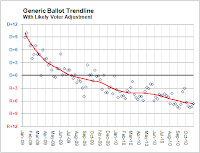
The story of the last two years is as simple as it is dramatic. It is the epic story of an administration with a highly ideological agenda encountering a rising resistance from the American people over the major question in dispute: the size and reach and power of government and, even more fundamentally, the nature of the American social contract. An adjudication of the question will be rendered on Nov. 2.
-Charles Krauthammer, Washington Post, October 22, 2010
Way back on July 4th weekend, Charlie Cook
observed that "recent numbers confirm that trends spotted late [Summer 2009] have fully developed into at least a category 3 or 4 hurricane." Now, 9 days from a historic midterm election,
all signs, macro and micro, point to that forecast holding true. Top Democratic strategists and pollster Peter Hart
acknowledges "it's hard to say that Democrats are facing anything less than a category 4 hurricane." He adds that "Election Day is coming, the hurricane force has not diminished, and it is going to hit Democrats head on."
Hart, like most analysts, see the House as a goner. The GOP will easily pass the 39-seat net gain mark required to take control of the lower legislative body. Nancy Pelosi's days as Speaker are numbered. Predictions on the number of Republican takeovers in the House range from the mid 40s to 75, a very bullish yet not insane prediction by my friend and colleague
Bobby Trivett. (Read
The Onion: Democrats Could Lose Up To 8,000 Seats, unfortunately, there are only 435 seats...) Democratic strategists are
pessimistic, saying the ceiling for Republican gains is "up to seventy." This upper tier of the window would far exceed even the gains Republicans made in 1994, 52 seats, and be the largest turnover in well over a half-century. In the Democratic wave of 2006, the party won 30 seats in a successful takeover effort. I am sticking with my September 23rd
projection of a 60 seat gain for Republicans, which many at the time thought was well out of bounds. Now, 60 seats is midrange among bullish predictions.

The rapid upward movement has resulted from an ever-
expanding House playing field. Nearly every day the National Republican Congressional Committee is inserting money and heat into districts previously thought wholly safe for Democratic incumbents, often launching television ads hitting these incumbents for votes in favor of one or more of 2010's "disqualifying issues," Stimulus, ObamaCare, Cap & Trade. Analysts now agree that
over 100 seats are in play. Making confident predictions as to how many of these 100+ seats will land in Republican hands is complicated by the fact that, according to those at the top of the Republican House efforts, the polling looks too good. These strategists are sending the polling back to be reweighted, having a hard time believing that the wave could actually be as high as indicated. In many cases, Democrats are seeing disparate results, sometimes to the order of 7 or 8 points, a difference that could flip dozens of races. But even despite their more favorable polling, the DCCC has moved into full triage mode, cutting off long-time incumbents who are beyond hope against the Republican wave.
The
Senate, on the other hand, has been a
roller coaster since
my predictions one month ago. While I don't see enough evidence race by race to change my admittedly bullish projection of a +10 Republican takeover in spite of the Tea Party disaster in Delaware, a
half dozen races around the country have seen a
natural tightening favoring Democrats as the election draws closer and Democrat voters come home, in some cases aided by unrelenting personal attacks against Republican opponents. Now that Democrats have lost the policy messaging battle on the Stimulus, ObamaCare and Gov't Spending more broadly in spectacular fashion, their only remaining strategy is to disqualify the opposition, making Republican candidates unacceptable alternatives to voters. Admittedly, some GOP candidates in Senate races have made this task all too easy with somewhat extreme or impolitic past statements that have become constant refrains on the airwaves. That word "
extreme" is the one thing that Democrats hope will save them from an electoral bloodbath on November 2nd.

Despite the clear tightening, the good news for Republicans is that Democrats have failed to disqualify Sharon Angle, challenging Majority Leader Harry Reid in Nevada, Ken Buck, challenging appointed Senator Michael Bennett in Colorado or Rand Paul, son of presidential candidate Ron Paul running for the open Senate seat in Kentucky. While the establishment, rather than Tea Party, backed Republicans in each of these races would likely be faring better against the Democrats, each of these three primary winners are still an even money chance or slightly better.
The Senate race that has made the most striking move towards Democrats in recent weeks is the open seat race in Pennsylvania. Democrat Congressman Joe Sestak, who toppled party-switching incumbent Arlen Specter back in May with a late surge is attempting to repeat the trick against Republican Pat Toomey who had run out to an
8 point lead as recently as a week ago before seeing it evaporate in recent days. The race had been moved to Lean Republican by most handicappers but now, a two point contest, is considered a toss-up. However, Toomey appears to have stopped the bleeding as Morning Call Tracking shows the race moving back in his direction. Trivett, a Pennsylvania native, observes, "with the Republican candidate from Pittsburgh's Alleghany County, it is hard to see how he loses this race." This logic is predicated on the fact that Democrats in Pennsylvania statewide races rely on very heavy liberal turnout, and a big margin, in the urban areas of Pittsburgh and Philadelphia which bookend an otherwise rural, blue collar, conservative state.
As of today, Real Clear Politics polling averages
indicate that Republicans would pick up 8 seats, two short of the 10 needed for Senate control. As discussed in my
last post, a Democratic White House necessitates 51 seats for Republican control; the party currently holds 41. On October 12th, RCP polling predicted a 10 seats gain and Senate takeover for Republicans; however, that same day, Illinois slipped to the Democrat's advantage, setting the GOP back. Mark Kirk has retaken the lead in the mud fest that has become the Illinois race, but in the meantime, West Virginia and Washington tipped towards Democrats, which is where we are today. All the while, the marquee Nevada race has teetered and tottered between Tea Party favorite Sharon Angle and the Majority Leader. Angle leads by a
fraction of a point today in a race that is all about the ground game now with precious few undecideds remaining. Senate control could hang on the Leader's seat, and we may not know the outcome for some time after Nov. 2.

Underlying each of these horse races that collectively will determine who controls the Senate in the 112th Congress, is the deeper question of whether Republicans may actually be better off, at least long term, taking the House but leaving the Senate in Democrat hands. As much as I enjoy cheerleading for a category 5, historic political hurricane to blow from sea to shining sea, I believe Republicans will be better positioned to challenge and defeat President Obama in 2012 if we do not assume control, and responsibility, for the entire legislative branch of the federal government. This outcome, while celebrated on November 3rd, would give the president a ripe foil to leverage, contrast and offload blame on as the American people predictably remain agitated and impatient with all things Washington over the next two years.
Former President Bill Clinton is the text book example of how triangulation and moderation in a new shared power climate in DC can be used to bolster the electoral prospects and stature of a previously unpopular president. Note the the last Republican wave to which I often draw comparisons was 1994, only two years before President Clinton
coasted to a second term by 9 points and 220 electoral votes over Bob Dole. I would rather not give President Obama that environmental advantage; however, many believe Obama is
incapable of adapting as nimbly as Clinton did and leveraging such an opportunity to his benefit. Moderation, the key ingredient in Clinton's success in 1995-96 is something we rarely see out of this much more liberal and ideological Commander and Chief.

One of my close friends serving as an aid to a Republican Senator agrees. He notes that "we don't want to be handing Obama a Republican Congress" adding "let's wait until 2012 to take it all back." I think this sentiment is spot on. It is also very likely that, if we fall a seat or two short this year, we would regain the Senate in 2012. This is due to some simple math and the flip side of Democrat's 2006 wave coin. This expansive and thus necessarily weaker class of Senators swept in by animosity towards George W. Bush in '06 will be up for reelection, 22 of them to be exact compared to only 9 Republican seats on the line. Anything short of appreciable Republican gains, more than enough for a Senate majority, under this Senate landscape would require a drastic shift in America's electoral environment over the next two years. Allowing that we've seen a stunning swing, rebellion really, over the last two years, I still see this as highly unlikely. Therefore, as hard as it is not to root for the max this year, we Republicans would almost certainly be better off giving the President a split decision in Congress to better position ourselves to usher him out of the White House and Republicans into Senate control in 2012. However, these long-term strategic considerations will have no bearing on how high the Republican wave rises on November 2nd, so we'll see what happens and seek to make the best of it as all attention turns to the 2012 presidential race on November 3rd.
In the world of politics, the next 9 days will be a lifetime. I will be writing as often as possible on the ripples that will define and comprise the eventual Republican wave set to make full landfall Tuesday a week from now. The existence of such a hurricane force wave is now beyond question; it is its depth and breadth that will keep all of us guessing until the final votes are counted... and with so many races going down to the wire, we could be on the edge of our seats for weeks to come.
 Happy Election Eve from Wisconsin! Walking the neighborhoods and working the phones in the Cheese State on behalf of Ron Johnson, an Oshkosh businessman poised to send career politician and 18-year Senate incumbent Russ Feingold packing has given me a unique and wonderful opportunity to hear directly from voters in this battleground state who are "mad as hell and not going to take it any more." The anger is real, the disappointment is real and the enthusiasm gulf is palpable. While our incredibly passionate and hard working Get Out the Vote volunteer teams across the state are setting national voter contact records, 160K calls in one day, the Democrats are paying volunteers, an oxymoron and sad commentary on the depressed state of their base, never mind independent and moderate voters.
Happy Election Eve from Wisconsin! Walking the neighborhoods and working the phones in the Cheese State on behalf of Ron Johnson, an Oshkosh businessman poised to send career politician and 18-year Senate incumbent Russ Feingold packing has given me a unique and wonderful opportunity to hear directly from voters in this battleground state who are "mad as hell and not going to take it any more." The anger is real, the disappointment is real and the enthusiasm gulf is palpable. While our incredibly passionate and hard working Get Out the Vote volunteer teams across the state are setting national voter contact records, 160K calls in one day, the Democrats are paying volunteers, an oxymoron and sad commentary on the depressed state of their base, never mind independent and moderate voters.



























